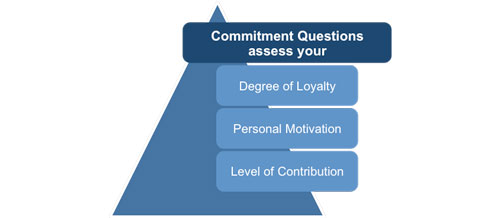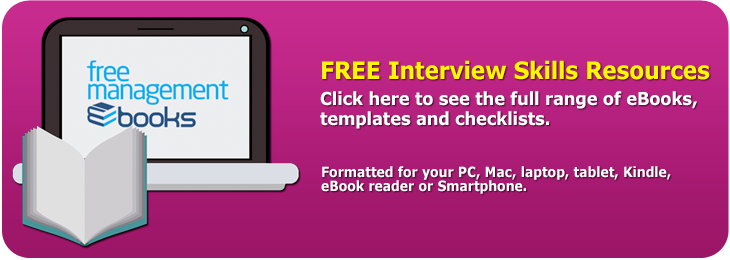Commitment Questions
These questions explore your motivational skills and willingness to commit to your responsibilities and the organization. Employee turnover is expensive and disruptive so most organizations want you to show a degree of loyalty to them in exchange for the benefits they are offering.
 |
This means that you need to exercise some judgment when answering 'commitment' questions. You don't want to give the impression that you'll be looking for another job after a few months, nor do you want to give the impression you lack ambition. The following questions are quite obvious but you need to be mindful there are more subtle ways they can be asked.
What was it like working for your previous employer?
The most effective way to answer this type of question is to focus on one aspect of that organization, such as leadership style, product development, adoption of technology, project philosophy, etc. As your answer develops, bring out the benefits of this experience and the value this will add to the new role and organization.
'I feel that I really benefitted from their use of matrix management in projects and found it developed by planning and organizational skills, which I would want to develop in my team.'
Don't forget that the interviewer is looking for how you display your commitment to the organization. You can also use this as an opportunity to emphasize your flexibility and focus on getting the job done.
Have you done the best work you are capable of?
Be careful in answering this because you could inadvertently give the impression you've peaked. Use your CPD plans to show that you always give 100% to every task, but you also believe that there is always something new you can learn that will improve your performance.
How long will it be before you make a net contribution?
The best way to answer is to acknowledge the induction period that most individuals receive when they join an organization and then say that you expect to be effective within a month or two from then.
You will know from the job description what the organization expects of you, so incorporate this into your answer. This also allows you to confirm that what you have read is still up to date. Every organization is aware of the settling-in period for new employees and their induction program is designed so that the individual will be contributing as soon as possible.
If you got this job, how long would you stay with us?
The job description and your own research into the organization will indicate the prevailing culture. With the increasing use of short-term contracts, organizations want to feel secure that you will commit for at least that period, so your answer needs to take account of contractual obligations.
'I see myself fulfilling the two-year contract. It presents some challenges I look forward to mastering and an opportunity to bring the breadth of my experience to the team and organization. If at the end of the contract there is an opportunity to extend or make the position full-time I would be more than happy to discuss it.'
Answering these questions requires a clear understanding of the organization's culture and should also acknowledge where you are in your career. For example, a mature individual implying that they are seeking a long-term role in a company would be on safe ground, but a graduate of two or three years implying the same thing could be seen as lacking ambition.
Be careful not to imply that you will only remain with them as long as you are being challenged and learning new skills. Your answer should acknowledge that your professional development is secondary to getting the job done, generating revenue, and meeting customer expectations.
You may also be interested in:
Interview Questions | Interview Behavior | Capability Questions | Commitment Questions | Compatibility Questions | Questions About Your Self-Image | Questions About Your Application | Questions You Should Ask.


